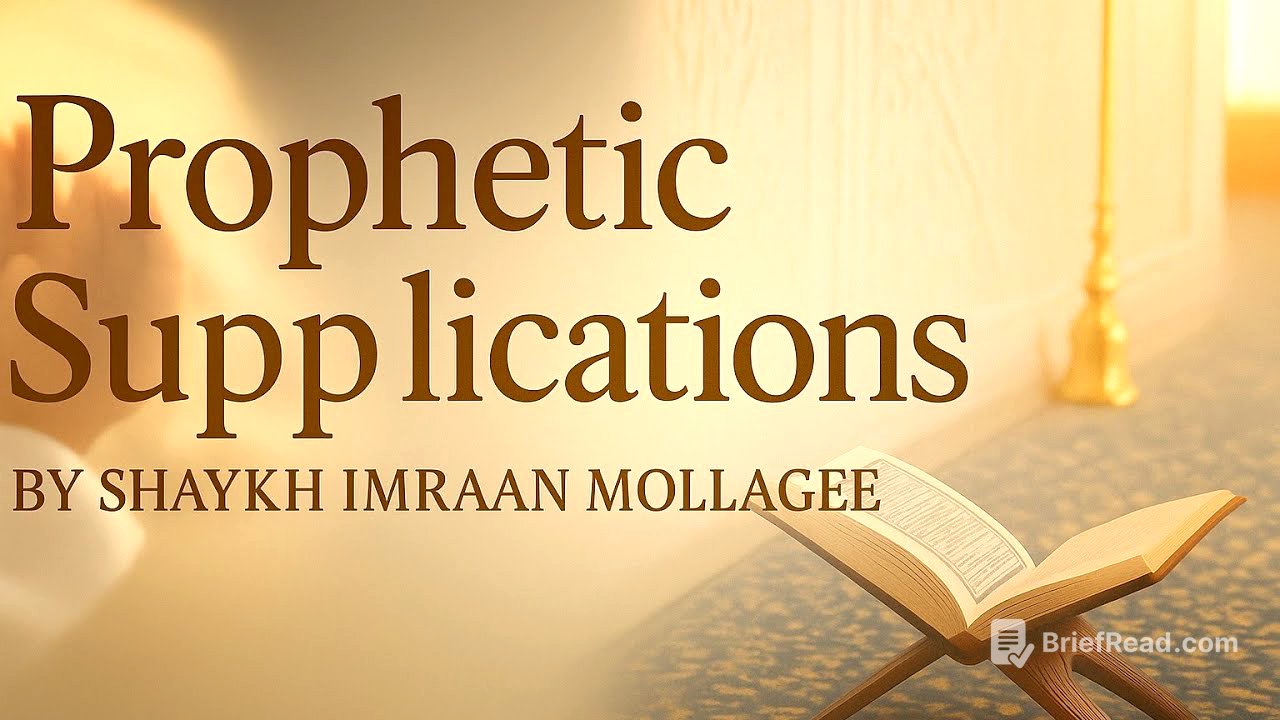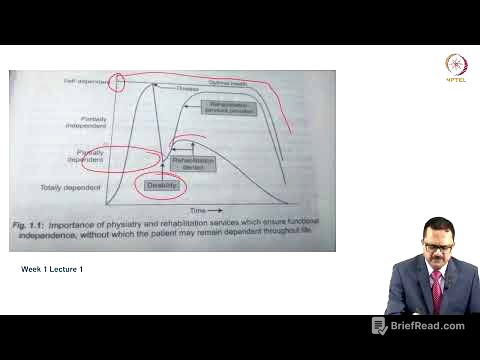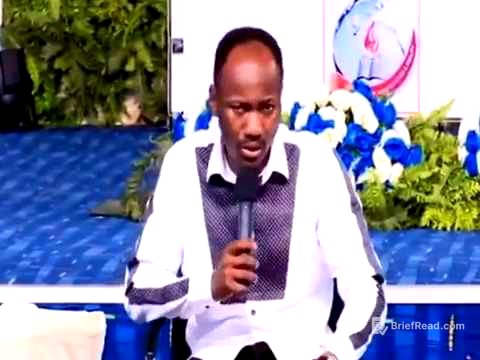TLDR;
This session focuses on reciting specific duas and adhkar (remembrance of Allah) in the morning and evening for protection and blessings. It covers the virtues of reciting certain chapters from the Quran, the importance of the statement of "La ilaha illallah," and various duas for seeking well-being, forgiveness, and protection from laziness, hardship, and the punishment of the grave. The session also addresses the permissibility of using counting aids and the significance of trusting in Allah while taking necessary means for protection.
- Reciting Surah Ikhlas, Surah Falaq, and Surah Nas three times each in the morning and evening is sufficient for protection in all aspects.
- The statement of "La ilaha illallah" is the best of dhikr, especially when recited with its complete form, acknowledging Allah's uniqueness, dominion, praise, and capability.
- Various duas are prescribed for seeking well-being, forgiveness, and protection from evils, laziness, hardship of old age, and the punishment of the fire and the grave.
- It's permissible to use counting aids for dhikr if it makes it easier, but the sunnah is to use the right hand.
- Trusting in Allah is paramount, and prescribed duas are means to seek His protection, not guarantees.
Virtues of Reciting Protective Chapters [0:03]
Reciting Surah Ikhlas, Surah Falaq, and Surah Nas three times each in the morning and evening is highly virtuous, as it suffices in all respects, providing comprehensive protection and care for one's needs. When reciting these chapters, one should have the intention to please Allah, follow the Sunnah of the Prophet Muhammad (peace be upon him), and seek the reward mentioned in the hadith, which includes Allah taking care of one's needs and providing protection. These three surahs are known as the chapters of protection, and reading them with the right intention ensures that Allah will be enough for the reciter.
The Excellence of "La ilaha illallah" [1:56]
Saying "La ilaha illallah" (there is none worthy of worship except Allah) is the best form of dhikr. It's permissible to say it at any time, even without moving the lips. The dying person is encouraged to say it as their last words to enter paradise. The complete form of the dhikr, "La ilaha illallah wahdahu la sharika lah, lahul mulku wa lahul hamdu wa huwa ala kulli shai'in qadir" (There is none worthy of worship except Allah alone, He has no partners, to Him belongs the dominion, and to Him belongs all praise, and He is able to do all things), should be recited in the morning and evening. This statement acknowledges that there is no deity worthy of worship except Allah, He is alone without partners, He possesses the dominion and all praise, and He is capable of everything.
Reciting "La ilaha illallah" During Hajj [5:23]
The Prophet Muhammad (peace be upon him) said that the best statement he and the prophets before him uttered was "La ilaha illallah." It is a Sunnah to recite this during Hajj. There are two hadith regarding the morning and evening recitation of this phrase. One hadith mentions reciting it ten times in the morning and evening, which brings the reward of 100 good deeds, the erasure of 100 bad deeds, the reward of freeing a slave, and protection until the evening. The other hadith speaks of reciting it 100 times a day, which brings the reward of freeing ten slaves, 100 good deeds, the erasure of 100 bad deeds, and protection from Satan throughout the day.
Counting Dhikr and Permissibility of Using Aids [8:42]
Reciting "La ilaha illallah" 100 times a day can be spaced out throughout the day, and it's not fixed to a particular time like morning or evening. The Prophet Muhammad (peace be upon him) used his right hand for counting dhikr. Some scholars interpret this as using the lines on the fingers, while others say it involves making a fist and putting fingers down one by one. Using apparatuses for counting is permissible if it makes it easier, especially when spacing out the recitation throughout the day. However, one should not believe there is any virtue in the apparatus itself. Some scholars consider using beads as bid'ah (innovation), while others permit it for ease.
Protection Through Dhikr: Means and Trust in Allah [16:03]
Reciting "La ilaha illallah" ten times in the morning provides general protection from all types of harm. These recitations are a means of seeking protection, and Allah is the ultimate protector. It's not permissible to invent new means of protection or assign virtues to things without proof. There is no guarantee that reciting these duas will prevent all afflictions, as Allah may test or raise one's rank through trials, or it could be a punishment for sins. Sins can break down barriers and prevent duas from being accepted.
Dua for Reaching Morning/Evening and Seeking Goodness [19:56]
The Prophet Muhammad (peace be upon him) used to recite a specific dua in the morning and evening. The dua starts with "Alhamdulillah" (praise be to Allah) for reaching the morning or evening, acknowledging that it is only by Allah's permission. The wording differs slightly for morning and evening. The dua includes asking Allah for all forms of goodness in the present day or night and seeking protection from all evil that could occur. It also includes seeking protection from laziness and the hardship of old age, as well as the punishment of the fire and the grave.
Dua for Entering Morning/Evening and Trusting in Allah [30:20]
The Prophet Muhammad (peace be upon him) used to say a specific dua every morning and evening, acknowledging that it is only by Allah that we enter the morning or evening, live, and die, and to Him is the resurrection. The wording differs slightly for morning and evening, with the morning dua ending with "and to you is the resurrection" and the evening dua ending with "and to you is the final return." This reminds us of the greater reality of resurrection and the final return to Allah. This dua should be recited upon waking up, regardless of the time.
Sayyid al-Istighfar: The Master of Seeking Forgiveness [34:52]
Reciting Sayyid al-Istighfar (the master of seeking forgiveness) is the best way to seek Allah's forgiveness. The Prophet Muhammad (peace be upon him) said that whoever recites it during the day with firm faith and dies before the evening will be from the people of paradise, and the same applies to the one who recites it at night. The dua starts with praising Allah as the Lord, the Creator, and the Sustainer. It acknowledges that there is none worthy of worship except Him and that we are His slaves. It also acknowledges our commitment to His covenant and seeks refuge in Him from the evil of our deeds.
Acknowledging Allah's Favours and Seeking Forgiveness [39:16]
The Sayyid al-Istighfar continues with acknowledging all of Allah's favours and our sins, seeking forgiveness because no one can forgive sins except Him. It's important to acknowledge sins and not justify them. The dua emphasizes that no one can forgive sins except Allah. It's incorrect to seek forgiveness from anyone other than Allah, even from the Prophet Muhammad (peace be upon him) after his death. The Sahabah (companions) never went to his grave to ask for forgiveness.
Comprehensive Dua for Well-being and Protection [47:25]
The Prophet Muhammad (peace be upon him) never failed to utter a specific dua in the morning and evening, seeking well-being in this world and the hereafter. This dua is one of the most powerful adhkar and duas one can recite. It includes asking Allah for well-being in religion, worldly matters, family, and possessions. It also includes asking Allah to conceal faults, calm fears, and protect from all angles: front, back, right, left, above, and below. This dua is of utmost importance due to the comprehensive nature of its requests.
Seeking Daily Protection with Allah's Name [1:00:27]
Reciting a specific dua three times every morning and evening provides daily protection. The dua is "Bismillahil-lazi la yadurru ma'asmihi shai'un fil-ardi wa la fis-sama'i, wa huwas-Sami'ul-'Alim" (In the name of Allah, with whose name nothing can cause harm in the earth nor in the heavens, and He is the All-Hearing, the All-Knowing). With Allah's name, nothing can cause harm in the earth or heavens, and He hears and knows everything. This dua should be recited with certainty and belief.
Benefits of Reciting for Daily Assistance [1:08:02]
Reciting "Hasbiyallahu la ilaha illa Huwa, 'alaihi tawakkaltu, wa Huwa Rabbul-'Arshil-'Azim" (Allah is sufficient for me, there is none worthy of worship except Him, I have placed my trust in Him, and He is the Lord of the Majestic Throne) seven times in the morning and evening brings Allah's sufficiency in all matters of this world and the next. This dhikr is for daily assistance and addresses concerns and needs. However, the narration stating that reciting it seven times is authentic is debated. While the version attributing it directly to the Prophet (peace be upon him) is considered fabricated, the version attributed to Abu Darda (a companion) is considered reliable due to its nature as a statement about unseen matters, which he likely learned from the Prophet (peace be upon him).









